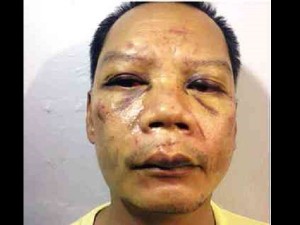Even after the court had called it a case of mistaken identity, the nightmare of security guard Rolly Panesa may not yet be truly over.
A human rights group on Friday slammed the military’s attempt to bring Panesa back to jail and called on the Court of Appeals (CA) to uphold its Aug. 27 ruling that ordered his release after 10 months in detention.
The Armed Forces of the Philippines (AFP) alleged that Panesa led a double life as communist rebel leader Danilo Benjamin Mendoza. He was arrested while walking home with his family on Aurora Boulevard, Quezon City, on Oct. 5 last year.
In an urgent motion for reconsideration, the AFP through solicitor general Francis Jardeleza said the appellate court’s Fifth Division should have denied the petition for a writ of habeas corpus filed by Panesa’s lawyers. It argued that the matter should have been handled by a trial court.
Charged with rebellion
“Unlike in habeas corpus (petitions) for custody of minors, questions as to the identity of the accused is best reserved to the court which acquired jurisdiction over his person,” the motion said.
The military has charged Panesa with rebellion in local courts in the cities of Taguig and Lucena. It claims to have witnesses who can prove that he and Mendoza are the same man.
“Consistent with the position that the trial court has the best and sole jurisdiction of the case, it is likewise respectfully submitted that the Honorable Court should have denied the petition for a writ of habeas corpus considering that the detention of Panesa is by virtue of a valid commitment order,” the motion added.
The AFP asked the CA to issue an order to rearrest Panesa, noting he was hastily released from Camp Bagong Diwa, Taguig City, despite the military serving notice that it would appeal the Aug. 27 ruling.
In a statement, the human rights group Karapatan denounced the military’s appeal as a bid to save face and justify the “illegal arrest” of Panesa.
Unlawfully denied liberty
It noted that the CA already stated it was “convinced that this is a case of mistaken identity” and that Panesa was “unlawfully” denied liberty. The court also noted that while the AFP described Mendoza to be a man in his 60s, Panesa hardly fit the description as he claimed to be only 48 years old.
Panesa’s family produced documents—including government-issued IDs—to prove his identity. Karapatan, who helped provide lawyers for Panesa, alleged that he was tortured while in detention.
“The military should stop these desperate machinations against Panesa and should instead answer the criminal charges of torture and illegal detention filed by Panesa in the Department of Justice,” Karapatan secretary general Cristina Palabay said.
